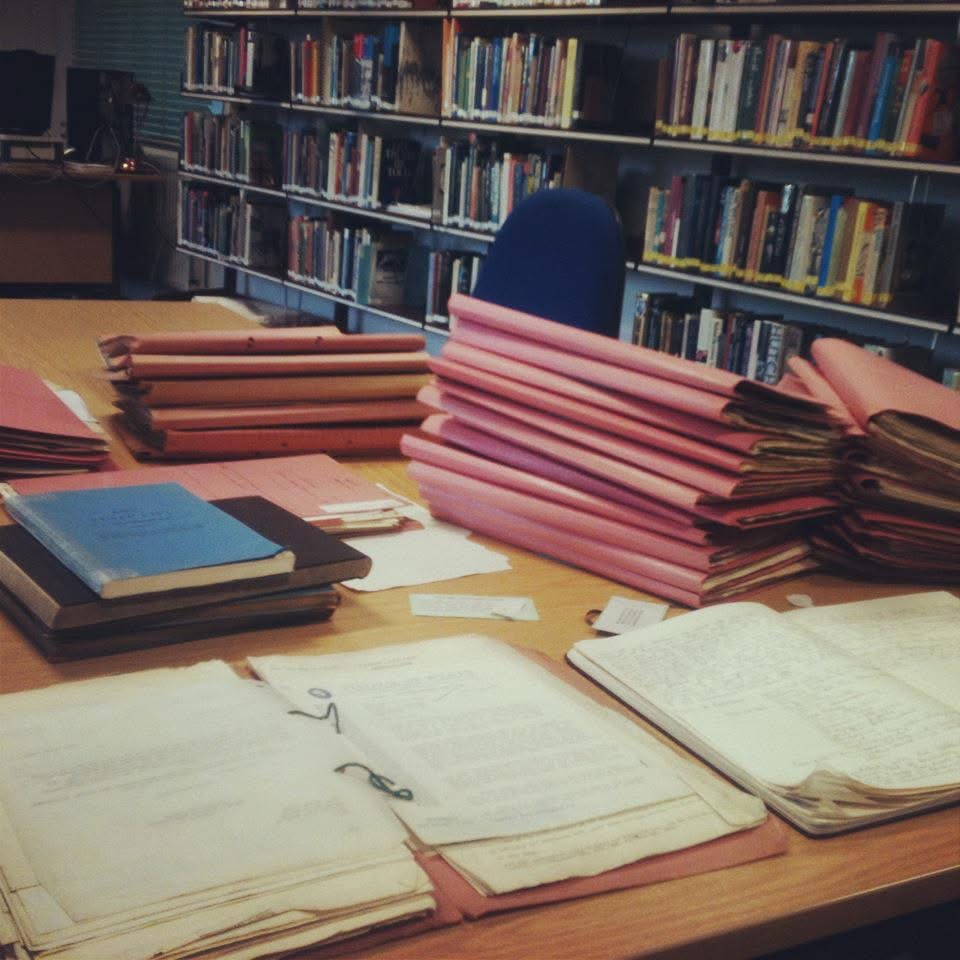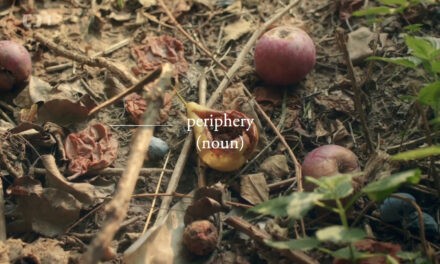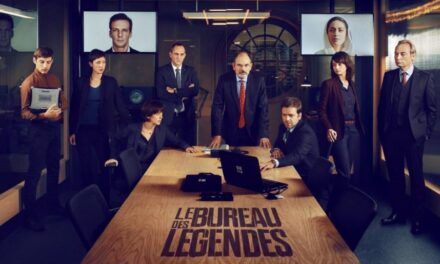
Archival work (photo courtesy of Helen Wheatley)
People following the last few weeks of the Critical Studies in Television blog will have seen my brilliant colleagues discussing the essential work that they have been able to do thanks to the previous researcher-led access arrangements at the BBC Written Archives. I was particularly struck last week by Kate Murphy’s account of her journey to bring women’s histories out of the archive via an initial foray as a radio producer and later as an academic researcher. Kate’s work has changed how we think about the history of women’s roles in radio and television production forever. Had she not had the opportunity to make the transition from maker to scholar of BBC programming, and to do the serious detective work of tracking down these women’s stories via the archive, our understanding of women’s roles in the BBC would still be partial and centred on the stories of ‘great men’ that Asa Briggs and others have told us. Kate, and our colleagues Ian Greaves and John Wyver, have led the campaign to challenge the BBC’s decision to cut researcher-led access to the BBC Written Archives (see Historians dismayed by ‘scandal’ of BBC cutting access to…). I am grateful to the three of them for standing up for the future of broadcasting research and for historians of all kinds.
Many of the bloggers have revisited previous archival research as a way to underline what we stand to lose from the BBC’s calamitous decision, and I could have done the very same thing. From the very beginning of my academic career, I have spent days tucked away in Caversham researching, for example, the early history of the Gothic and horror on BBC television (for my first monograph Gothic Television (Manchester University Press, 2006) or digging through previously unopened files to uncover a history of the ways the BBC put television on display at mid-century expos and trade fairs, or the early shaping of the holiday programme as a genre, or the hilarious, offensive, surprising and sometimes tragic story of colonial programme makers Armand and Michaela Denis for book number two, Spectacular Television: Exploring Televisual Pleasure (IB Tauris, 2016). I have fallen down research rabbit holes, ably assisted by highly skilled and committed archivists who have done quick overnight vetting to enable these archival rabbit chases, and found myself fully absorbed in these stories, grappling for some purchase on them and worrying about running out of time or funding or energy or patience before I have done them justice. I always, ALWAYS, think of the work of my ex-colleague Carolyn Steedman when I am at the Written Archives who describes (via Derrida) what she calls ‘Archive Fever Proper’, that malaise of feeling that you will never fully manage to make sense of all that is there to read and think on:
What keeps you awake, the sizing and starch in the thin sheets [in your hotel room] dissolving as you turn again and again within their confines, is actually the archive, and the myriads of its dead, who all day long have pressed their concerns upon you… You think: I could get to hate these people; and I can never do these people justice; and finally: I shall never get it done… Your anxiety is that you will not finish, that there is something left unread, unnoted, untranscribed. (from Carolyn Steedman (2001). “Something She Called a Fever: Michelet, Derrida, and Dust”. The American Historical Review (1937-5239), 106 (4).)
When I think about the anxiety of unfinished archival research now, it has taken on much greater proportions than just that end of the day/week/visit rush to see and read and think about all the piles of files that have been set before the researcher. If the BBC presses on with its current policy of no longer opening files based on research need, than I heavily feel the weight of having not got into that little reading room in Caversham sooner to make requests for future research. In effect, the BBC has clanged their doors shut on those histories, those stories, those lives and ways of working that are revealed through the joint industry of the historian and the archivist. That ‘not enough time’ feeling so eloquently described by Steedman hangs heavy on my heart when I think of all that there is still to do in this collection of such enormous national and international importance.
So, I’ve decided to write some snapshots of the research I haven’t yet done (with the heavy caveat that some of it might end up never being written – by me at least). I want to do this to make the point that it would be impossible for staff at the Written Archives to predict all of the future research that might be coming down the line or tucked away in the back of our heads for a rainy day (and therefore to make the relevant files open and available to us). Some of these future research ideas are fairly well formed and partly underway. Some of them sit in the category of ideas I once had and have been meaning to come back to. This is just the stuff rattling around inside one person’s head…
Project #1 – Travellers on Television. This is a project that has actually begun. At the beginning of 2024 I began some experimental historiographical work looking simultaneously at the history of the representation of travelling communities on TV (I began with canal-based communities) and at how you might go about researching and exploring that history collaboratively with those communities. I have new writing about to be published on this history in the Journal of British Cinema and Television and on the experimental historiographic methods in Joanne Garde Hansen and Red Chidgey’s forthcoming memory studies collection. But I am painfully aware that there are also countless stories to be found in the BBC Written Archives about people who live and work on the canal, or about Gypsy and Roma communities, or about travelling people of all kinds and the ways that they got involved with BBC programme makers that will remain inaccessible to me for some time to come.
Project #2 – the Incarcerated TV project. This was a very early idea for some doctoral research which I always thought I would come back to. I am fascinated by the history of television watching in prisons. This probably comes from a lifetime of family members working for the prison service and occasional conversations with them about the complex negotiations that have taken place about viewing around shared sets, or the ways that television was used as both punishment and reward in prisons. Much of this history will be found elsewhere, but I have always meant to check if there is correspondence between the BBC and the prison service, or whether correspondence between prisoners and programme makers could be found in the files. Television Studies from its earliest days has been interested in the dynamics of domestic and family viewing but what happens when television gets taken out of the family/domestic context? What happens when television is incarcerated? Maybe we will now never know.
Project #3 – Humans of Television. This is imagined as a large-scale research project on the history of television’s attempts to make programmes under an ethnographic impulse. I have long been interested in the output of the BBC’s Community Programmes Unit, and indeed have written about a section of their output (relating to the lived experience of death, dying and bereavement) in my most recent book, Television/Death (Edinburgh University Press, 2024) but I have always wanted to take this work further to look at television’s experiments in ethnography centring programme making on the lives of ordinary people and the amplification of their voices.
Project #4 – The Ark-Hive: A new history of natural history television. While researching some earlier work on natural history broadcasting I became aware just how partial and fragmentary histories of this genre are in the UK and beyond. I imagine the archive as both ‘ark’ and ‘hive’ in this instance: as a place of preservation and a site which contains the traces of great industry/activity centring on the natural world. In this moment of climate crisis and threat to biodiversity, the fact that the BBC Written Archive contains traces of vanishing species is highly significant. Years ago, I became entranced by accounts of early attempts to film and sound record the most ordinary of British species (many of which are now endangered) when ‘dipping into’ this history, only to become distracted by the stories of programme making in colonial Kenya that I ended up writing about. I would love to get back to this. But the search for a more complete account may now be beyond my or anyone else’s grasp
Ultimately, the issue of ongoing access to the BBC’s Written Archive doesn’t just affect me and my unresearched/unwritten projects. I asked friends and colleagues to tell me about the things they hadn’t written yet and here are some of their replies. This blog thus finishes as a kind of listicle of things that others have toyed with researching either recently or in the dim and distant past. Stuff they’ve had to set down or set aside. Ideas that have never fully formed but could have done in the future with access to the right resources. I would love it if others would add their own accounts of things they haven’t written (yet) to this article via the comments section below.
Rick Wallace (Director of Film and Television Studies, University of Warwick)
I am in the early stages of developing a research project that considers the place and importance of ‘fun’ in the history of (British) television. This will consider aesthetics, but also aspects of television policy, production and regulation, and it isn’t predictable at this stage what archival material might be useful or available. Inevitably some of the go-to places where ‘television fun’ might be found are in genres which may not be priorities when it comes to access requests (game shows, light entertainment, children’s television etc.) because of assumptions made about cultural importance or hierarchies of taste and value. Thus, any potential selection/admission policies that prioritise ‘the serious’ or ‘the worthy’ may inherently work against studies of the mainstream or the popular; in other words the kinds of genres that have often been at the centre of Television Studies as a discipline. In addition, some of this material would certainly pertain to the period after 1990s, and the new terms of access raise serious questions about how ‘new’ (or at least, more recently produced) material will be released in the future, once it becomes ‘archival’.
Hannah Andrews (Associate Professor in Film and Media, University of Lincoln)
While I was researching Biographical Television Drama (Palgrave Macmillan, 2021) I came across a TV producer called Joy Harington in the BBC archives. She was a children’s producer in the 1950s, and made two landmark religious drama series, Jesus of Nazareth (1956) and Paul of Tarsus (1960). The archives seemed to contain a fascinating picture of her experience working on these programmes. For example, there are some examples of her being patronised by the religious establishment and self-appointed moral guardians who were deeply suspicious of the whole endeavour of representing Jesus’ life on screen. In her responses, she tended to point to her motivation in her own faith, which appeared to be genuine but was also, clearly, rhetorically useful to her. I had intended to follow this up, looking at Harington’s files to see what could come of it. This has ended up on the backburner, and is very unlikely to go anywhere if the proposed changes to access to the BBC Written Archive go ahead.
Joanne Garde-Hansen (Head of School, Media and Communication, University of Leeds)
My work yet to do involves building on the Media and Water (2021) book where I drew on the Written Archive Centre files for a chapter on drought records from the 1920s to 1976, and the ESRC funded Sustainable Flood Memories project which has been named by UK government as a case study of how UKRI research has demonstrable impact. The SFM framework and findings rolled out by the Environment Agency among flood risk communities as a protocol for engagement were built on access to flood memories from media archives (ie WAC). The BBC Written Archive was and remains the most important single source of long-term living history and memories of UK flooding (and global flood histories as well). I made this point about the importance of the BBC’s role among others here. Importantly it has the analogue materials for the flood risk periods of the late 1940s, the East coast storm surge of 1953, as well as unique kinds of flood (snow melt, Lynton and Lynmouth, Hull). It offers a joined-up cultural memory of climate risk and resilience for local communities and catchments in the UK. As custodian of the UK’s cultural memory of flooding and drought across urban and rural communities there are records in the BBC Written Archives that reveal adaptations to environmental risk; these are important to pass down to future flood and drought risk communities. The scripts and research for The Archers (1951—) alone are vital for good thinking on community resilience. The sources for sustainable flood memory are from the radio transcripts from farming programmes from the 1920s and 1930s, scripts from both drama and television news reports throughout the 50s, 60s, 70s and 80s, but most importantly all the below the line production materials from location, audiences etc. It is worth noting that Flood Drought Histories are not linear. They have a rate of return that resonate with past rates of return, hence the climate risk scepticism that pervades – because people have living memories of hotter or wetter periods. The WAC has all the evidence of a flood or drought as it happens, the government responses, and the ‘building back better’ (such as Thames Barrier or dredging the Somerset Levels). If this archive is not accessible to researchers for impact and challenge driven research, the UK government will lose an important source of flood and drought knowledge.
Katie Crosson (Postdoctoral Research Associate in Curation on the project ‘Women’s Screen Work in the Archives Made Visible’ at the University of Exeter.
I wish to explore the credited & uncredited work of script editor Ann Scott for Play for Today (BBC1, 1970-1984). The BBC Written Archives is the only place I would be able to access correspondence between Scott and writers, directors and producers for the strand; annotated scripts she worked on; and official information about her contractual and extra-contractual commitments, allowing me to fully investigate the extent of her role in creating a degree of continuity across 49 plays or the strand in general. Without full access to the archive, my research will be at best heavily delayed and obstructed; at worst, it will remain partial, incomplete, and over-reliant on (often conflictual) testimonies.
Professor Helen Wheatley is Professor of Film and Television Studies, co-founder of the Centre for Television Histories , and Academic Director of the Warwick Institute for Engagement. She writes about television history and aesthetics and works collaboratively with archives and curators to engage the public with the history of British broadcasting. Her book, Spectacular Television: Exploring Televisual Pleasure (IB Tauris, 2016) won the BAFTSS Award for Monograph of the Year in 2017 and she recently published the monograph Television/Death (Edinburgh University Press, 2024) which intertwines the study of death, dying and bereavement on television with discussion of the ways that television (and the TV archive) provides posthumous access to the dead. She is at the beginning of a new project, tentatively titled Television and Travellers, that looks at how travelling/mobile communities have been represented on British television across its history and is working with those communities to explore the television archive in new ways.





